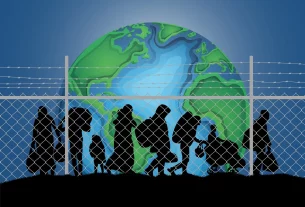(Berlin, April 23, 2024) – Kazakhstan’s President Kasym-Jomart Tokayev signed a new law on April,15, 2024, to strengthen protections from violence for women and children, including domestic violence survivors, but it falls short in key areas, Human Rights Watch said today. The law aims to advance women’s rights and enhance their safety, but among other concerns, it fails to explicitly make domestic violence a stand-alone offense in the criminal code or elsewhere.
“It is significant that Kazakhstan’s leadership has prioritized protecting women and children from violence, and adopting this law is an important step forward,” said Hugh Williamson, Europe and Central Asia director at Human Rights Watch. “But more should be done to ensure that women and children are protected from family abuse in accordance with international human rights standards, including by criminalizing domestic violence as a stand-alone offense.”
The new law, known as Kazakhstan’s “domestic violence” law, introduces amendments to Kazakhstan’s Criminal Code, the Law on the Prevention of Domestic Violence, the Law on Marriage and Family, and other laws. The passage of the new law coincides with the ongoing high-profile trial of Kuandyk Bishimbayev, Kazakhstan’s former economy minister, who is charged with the murder of his wife, Saltanat Nukenova. The trial has drawn national and international attention and ensured a focus on the urgent need to tackle domestic violence with adequate sanctions for abusers and trauma-informed support for survivors.
Women in Kazakhstan face high rates of domestic abuse. According to the Ministry of Internal Affairs, in 2023 police received 99,026 complaints related to family violence and courts sentenced 67,270 people with administrative sanctions.
The law reimposes criminal penalties for “battery” and “intentional infliction of light bodily harm” committed against “an individual in helpless condition or financially or otherwise dependent on the perpetrator,” the articles most commonly used in domestic violence cases and introduces tougher penalties for convicted abusers. Both offenses had been decriminalized in 2017.
Under the new law, the duty to collect evidence in cases of domestic abuse is assigned to the police, a shift from its being the sole responsibility of the survivor. In addition, the law provides that police must register and investigate all cases of domestic violence, even in the absence of a survivor’s complaint, including in response to reports of domestic violence in the media or on social media.
The law also eliminates the option of seeking “reconciliation” between parties as a way of resolving cases of repeated “battery” and “light bodily harm.”
These are notable and important improvements, but the changes introduced by the law fall short of criminalizing domestic violence as a stand-alone offense either in the Criminal Code or Kazakhstan’s 2019 Law on the Prevention of Domestic Violence.
International human rights law mandates recognizing domestic violence as a serious crime against a person and society, Human Rights Watch said.
But the law lacks a separate definition of the offenses when they occur within the family or household relations, a missed opportunity to ensure that when committed as a form of domestic violence, such offenses, including “battery” and “light bodily harm” are treated as a separate crime from other types of violence, and with the seriousness required by international human rights norms.
The law includes a reference to the promotion of “traditional family values” based on “strengthening the institute of marriage and family…” Such language risks downplaying domestic violence as such, as well as violence that takes place in unregistered relationships, or is inflicted by relatives or in-laws, and does not reflect a zero-tolerance approach to domestic violence, Human Rights Watch said.
The law also lacks concrete provisions on monitoring and evaluating its implementation and impact. Putting the law into effect without delay, raising public awareness about it, as well as ensuring survivors’ access to justice, services, and support, especially in rural areas, should be the next priorities for the government of Kazakhstan, Human Rights Watch said.
Kazakhstan’s international partners should also take this opportunity to urge the Kazakh government to criminalize domestic violence as a stand-alone offense, establish a monitoring mechanism to ensure the law is being properly implemented, and to ratify the Council of Europe’s convention on preventing domestic violence, known as the Istanbul Convention.
“Women in Kazakhstan have been waiting for comprehensive legislation to help end domestic violence and violence against women, and to effectively prosecute their abusers for a long time,” Williamson said. “It is important for Kazakhstan’s authorities to see the adoption of this law as only the start of many steps needed to eradicate the scourge of violence against women in Kazakhstan.”


